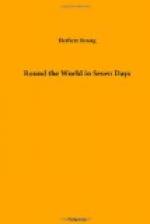There was much excitement on board the gunboat when the aeroplane planed down and soared over it at its own pace, just high enough to be out of reach of sparks from the funnel.
“Who are you?” shouted Smith through a megaphone.
“Gunboat Penguin, Captain Durward, bound for Bombay. Who are you?” came the answer.
“Lieutenant Thesiger Smith, of the Imperturbable, bound for Karachi.”
“The deuce you are! What do you call that vessel of yours?”
“My pet lamb,” replied Smith, grinning. “I say, sir, I’ve no time for explanations. Are you policing these seas?”
“This is my beat. Why?”
“Some Baluchis are gun-running fifty miles up the coast, that’s all. Thought you’d like to know.”
“Are they, begad! Thanks for the tip. Can you describe the spot?”
“A tiny village lying behind a point. A river runs through it, and there’s a short jetty. Sorry I can’t give you latitude and longitude. You’ll catch ’em if you hurry up. Hope you will, and—run ’em in. Good-bye.”
He set the engine at full speed again, and as the aeroplane soared on like a swallow its departure was followed by a lusty British cheer.
“Three hours late, mister,” Rodier bawled in Smith’s ear.
CHAPTER VII
THE WHITE DJINN
It was half-past six by Smith’s watch, near eleven by local time, when the aeroplane sailed across the long mangrove swamp that forms the western side of the harbour of Karachi. The sun was intensely fierce, and Smith, who found its glare affecting his eyes painfully, had donned a pair of huge blue-glass goggles. He was glad that he had done so when, passing over the crowded shipping of the port, he saw the sandy arid tracts around and beyond the town. Steamers hooted as the aeroplane flew above them; half-naked coolies lading the vessels with wheat and cotton, the produce of Sindh and the Punjab, dropped their loads and stared upwards in stupefied amazement. Smith could not wait to enjoy his first view of an Indian city. His business was to land at the first convenient place and find Mr. John Jenkinson, whose godown was near the Custom House, and obtain from him the petrol bespoken by Mr. Barracombe.
Being in complete ignorance where the Custom House lay, though he guessed it would be somewhere near the seafront, he was at first at a loss in which direction to make. There was no suitable landing-place in the crowded city itself, and to the immediate south of it there appeared to be nothing but mangrove swamps. Ascending to a considerable height, however, he saw, some distance to the east, near a railway line, a stretch of open brownish ground on which little red flags stood up at intervals. He instantly jumped to the conclusion that this was the golf course, though at this time of day there were no players to confirm his judgment. This was an advantage, because it promised that he might land without being beset by curious spectators. Accordingly he steered in that direction, hoping that having safely landed his aeroplane he might find some means of reaching the merchant whose name Mr. Barracombe had cabled to him.




